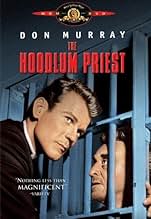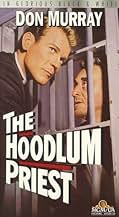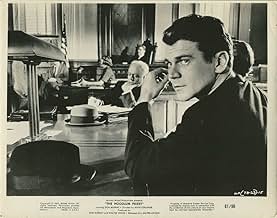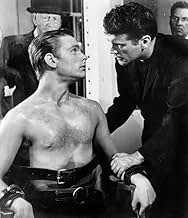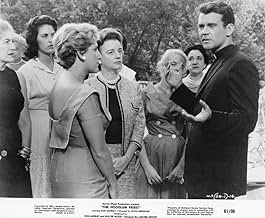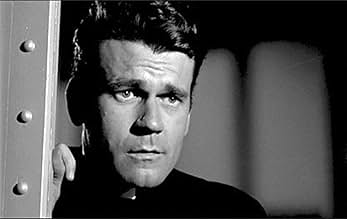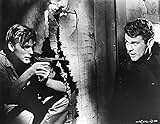IMDb-BEWERTUNG
6,6/10
518
IHRE BEWERTUNG
Füge eine Handlung in deiner Sprache hinzuBased on the life of Fr. Charles Clark, a minister to street gangs.Based on the life of Fr. Charles Clark, a minister to street gangs.Based on the life of Fr. Charles Clark, a minister to street gangs.
- Auszeichnungen
- 2 Gewinne & 1 Nominierung insgesamt
Norman McKay
- Father Dunne
- (as Norman MacKaye)
Walter L. Wiedmer
- Father David Michaels
- (as Walter Wiedmer)
Empfohlene Bewertungen
The true story of Jesuit priest Father Charles Dismas Clark and his struggles in opening a halfway house for recently-paroled convicts in '50s-era St. Louis. Lead actor Don Murray (who also co-produced the film and co-wrote the screenplay under a pseudonym) was reportedly inspired to tackle this project after meeting the real Father Dismas Clark, who is credited as technical adviser; still, one can see right away how this production got funded, what with a violent police standoff in the third act, capped with a dramatic gas chamber sequence. Despite talented Irvin Kershner as director and Haskell Wexler as cinematographer, the picture isn't any more weighty or profound than the juvenile delinquent programmers of the previous decade. Keir Dullea makes a strong debut as a troubled youth, but Murray and the other cast members generally fail to impress. *1/2 from ****
A visit to the other side of the tracks is what to expect here keeping mind that this could be the story of anyone young, misguided and lost without direction and surrounded by temptation and hopelessness. With that mind, watch how everything can wrong (Murphy's law) and then some. This movie also takes us to the fine line of choice and how in a moment of weakness or impulse, one bad choice can bring your whole life crashing down. Can't happen to you...you say? That's who visits with first. Also anyone that has lived knows the truth of this statement. How many times have we all said to ourselves: there go I but for the grace of God? The movie drives this point home too. Ten cents or ten million, all face the same problems and at the same time all of us have the same remedy too i.e. HOPE. If you add prayer to that and a sincere effort, you can rise above just about anything. Why? We were not put here to be defeated. Some really good dialog and scenes that try to reach for your emotions. Let them! One more thing. If someone has nothing and they offered anything and that offer should be respected even if your ...
I was 13 when this film came out and while I don't know for sure why I never got to see this. I'm guessing, morals being what they were at the time; this was probably judged to rough a movie for a boy my age. It probably would have been a R rated movie in it's day. So when I saw it listed on Turner Classic Movies I thought great, I finally get a chance to see this old film. Well now that I've seen it I'm amazed this film gets so much buzz. I found it to be way to melodramatic, over acted and just plain hammy. I'm not sure how this could have ever been relevant. I know that Father Clark did great work in his time; but this seems a poor way to tell his story. Almost everyone in this movie is over acting. I'm guessing that's the fault of the director, but that doesn't make it any easier to sit through. I'm sure many will be drawn to this film by Keir Dullea's name in the cast. Dullea's fame comes from 2001 a film whose uniqueness at the time; pulled along most of the actors who happened to be in it. Like the Hoodlum Priest there were no great performances in that film either. A film for film school students, theater majors, and nostalgia buffs. A corny waste of time.
Excellent movie of a true story. Father Clark did his best to help the criminals, but the punks have to help themselves first. Great movie made entirely in St. Louis, a tough film to watch.
Irv Kerschner, who was George Lucas' teacher at USC and later directed one of his pupil's Star Trek features, made this glossy well-meaning melodrama released by United Artists in 1961. Shot on location in St. Louis and featuring the semi-documentary but often overly self-conscious B&W cinematography of Haskell Wekler, the story is based on the real life story of a Jesuit priest --perhaps the first man in America to set up a half-way house for ex-cons. Although its heart is in the right place, and the film makes the plea that the criminal justice system in the United States only serves to criminalize young offenders rather than reform them, Kershner cannot resist all the obvious opportunities to be arty: chases through railroad yards and into abandoned buildings with broken furniture and boarded-up windows providing the right shadows on the wall. He also hammers home his point by squeezing out the last drop of melodrama from the shaky plot, including a totally implausible electric chair sequence with the priest admitted into the chamber as his hoodlum friend is about to be electrocuted. The film tries to have its cake and eat it, too. In real life the Irish priest was helped to build his halfway house by a Russian-Jewish immigrant attorney, Morris Shenker, but the film homogenizes their relationship; the young offenders somehow feel as if they dropped out of "West Side Story," made the same year, because they were unable to sing and dance.
Wusstest du schon
- WissenswertesConcerned that the critics would not be kind to an actor appearing in a film he wrote, Don Murray penned the screenplay under the pseudonym "Don Deer", his nickname as a track and field athlete in high school in Rockaway, NY.
- VerbindungenReferenced in Communion: Messe des Grauens (1976)
Top-Auswahl
Melde dich zum Bewerten an und greife auf die Watchlist für personalisierte Empfehlungen zu.
Details
- Erscheinungsdatum
- Herkunftsland
- Sprache
- Auch bekannt als
- The Hoodlum Priest
- Drehorte
- 301 East State Street, Jefferson City, Missouri, USA(Missouri-Pacific Railroad train station)
- Produktionsfirma
- Weitere beteiligte Unternehmen bei IMDbPro anzeigen
Box Office
- Budget
- 600.000 $ (geschätzt)
- Laufzeit1 Stunde 41 Minuten
- Farbe
- Seitenverhältnis
- 1.66 : 1
Zu dieser Seite beitragen
Bearbeitung vorschlagen oder fehlenden Inhalt hinzufügen



